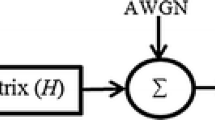Abstract
Complexity of different sphere-decoding (SD) algorithms is heavily influenced by their own distinctive computational features. Sphere radius setting for initialization and reduction during the search process, is one of the most important aspects affecting the SD efficiency. This paper examines radius setting strategies for list sphere-decoding (LSD) algorithms to calculate the soft-output information for coded systems, and proposes strategies to improve both the radius initialization and reduction in the original LSD algorithm. The proposed strategies can avoid the instability problem in the radius initialization of the original LSD algorithm and significantly increase its search efficiency as confirmed by simulation for both full-column-rank and underdetermined MIMO channels.
Similar content being viewed by others
References
Agrell E., Eriksson T., Vardy A., Zeger K. (2002) Closest point search in lattices. IEEE Transactions On Information Theory 48(8): 2201–2214
Damen O., Chkeif A., Belfiore J. C. (2000) Lattice code decoder for space-time codes. IEEE communications Letters 4(5): 161–163
Vikalo H., Hassibi B., Kailath T. (2004) Iterative decoding for MIMO channels via modified sphere decoding. IEEE Transactions Wireless Communication 3(6): 2299–2311
Brunel L. (2004) Multiuser detection techniques using maximum likelihood sphere decoding in multicarrier CDMA systems. IEEE Transactions Wireless Communication 3(3): 949–957
Hassibi B., Vikalo H. (2005) On the sphere decoding algorithm: Part I, the expected complexity. IEEE Transactions Signal Processing 53(8): 2806–2818
Vikalo H., Hassibi B. (2005) On the sphere decoding algorithm: Part II, generalizations, second-order statistics, and applications to communications. IEEE Transactions Signal Processing 53(8): 2819–2834
Jalden J., Ottersten B. (2005) On the complexity of sphere decoding in digital communications. IEEE Transactions Signal Processing 53(4): 1474–1484
Cui, T., Tellambura, C. (2004). An efficient generalized sphere decoder for rank-deficient MIMO systems. IEEE Vehicular Technical Conference Fall.
Damen M., Meraim K. A., Belfiore J. C. (2000) Generalised sphere decoder for asymmetrical space-time communication architecture. Electronics Letters 36(2): 166–167
Dayal, P., Varanasi, M. K. (2003). A fast generalized sphere decoder for optimum decoding of under-determined MIMO systems, 41st Annual allerton Conference on communications Control And computer.
Yang Z., Liu C., He J. (2005) A new approach for fast generalized sphere decoding in MIMO systems. IEEE Signal Processing Letters 12(1): 41–44
Wang P., Le-Ngoc T. (2009) A low-complexity generalized sphere decoding approach for underdetermined linear communication systems: performance and complexity evaluation. IEEE Transactions on Communications 57(11): 3376–3388
Chang X. W., Yang X. H. (2006) A new fast generalized sphere decoding algorithm for underdetermined sphere decoding algorithm for underdetermined MIMO systems. 23rd Biennial symposium on communications, pp 18–21
Boutros, J., Gresset, N., Brunel, L., Fossorier, M. (2003). Soft-input soft-output lattice sphere decoder for linear channels (pp. 1583–1587). IEEE Globecom 2003.
Hochwald B. M., Brink S. T. (2003) Achieving near-capacity on a multiple-antenna channel. IEEE Transactions on Communications 51: 389–3991
Wang R., Giannakis G. (2006) Approaching MIMO channel capacity with reduced-complexity soft sphere decoding. IEEE Transactions on Communications 54: 587–590
Wiesel, A., Mestre, X., Pages A., Fonollosa, J. R. (2003). Efficient implementation of sphere demodulation. 2003 4th Workshop on Signal Processing, pp. 36–40.
Author information
Authors and Affiliations
Corresponding author
Rights and permissions
About this article
Cite this article
Wang, P., Le-Ngoc, T. A List Sphere Decoding Algorithm with Improved Radius Setting Strategies. Wireless Pers Commun 61, 189–200 (2011). https://doi.org/10.1007/s11277-010-0018-4
Published:
Issue Date:
DOI: https://doi.org/10.1007/s11277-010-0018-4




